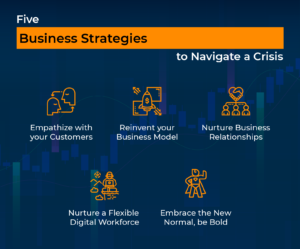COVID-19 pandemic is the black swan event that has brought many dimensions of our world to an inflection point, even the way we greet; “Namaste” instead of the handshake has become the new normal.
We live in a connected world, and a global crisis affects everyone and the global economy. Hence all companies need to be adaptable to economic shocks and learn from them. COVID-19, will continue to bring in huge changes in the market dynamics. At this stage, it is important for businesses to have their eyes and ears open, understand the frequent changes, evaluate and strategize. Though the current time is tough, businesses need to build capabilities for the future so that they are well placed when the demand picks up.
Strategy is thus, at the center of managing a crisis. Here are some strategies that organisations can explore:
Nurture Business Relationships
One of the most important survival practices is nurturing old and building new relations. A person needs two types of friends – one who is happy to see you happy and one you can reach out to when everything is going bad. A relationship between businesses and it’s clients or customers is also likewise. In the growing economy, a lot of vendors will stick around clients wanting to have a pie of growth. However during tough time like this, introspection may hold the key:
Is your business available to help your client or customer?
What difference is your business creating to help clients do better?
Customers won’t forget vendors, partners or brands who supported them during tough times. It’s time to build lasting relationships and focus on co-survival.
Empathize with your Customers
Crisis is a change of large magnitude, and it creates challenges for everyone. Empathize with your customers, understand their new challenges and provide solutions that can help alleviate their pain points. Organizations can also push aggressively for more products or vitamins to their customers, but that strategy does not succeed. An elaborate research on business strategies after the great recession of 2008, by Harvard professors1 reveals that promoting or pushing products would not work because customers want cost-effective and need-centric products. Elaborate product offerings reveal a lack of empathy.
Reinvent your Business Model
Businesses are facing challenges like – business continuity, change in volume, customer behaviour, unpredictable future, workforce productivity and real time decision making. With recession looming large, every business will have to innovate in what they are offering and excel in whatever they are doing as customers will be willing to pay if you are solving their problems. Under stress, it is prudent to cut your discretionary spending but it is also wise to invest it in your future. This will ensure you are best placed to capitalize when demand picks up.

- Gyms like David Lloyd and PureGym, GymCube, Fitbit, Psycle London are a few examples of reinvention of business models by offering online workout sessions using things available at home. Some offered free subscriptions for the first few months to keep people engaged and many have seen a surge in business and brand recognition.
- Many retailers invented their contactless delivery models to help quarantined households.
- A few perfume companies such as LVMH, and liquor companies, bars like BrewDog pivoted to make hand sanitizers.
- Many educational institutions moved their courses online.
- A handful of ational institutions moved their courses online.
- A handful of car manufacturers, and F1 teams, started making thousands of ventilators.
These are a few examples of how companies changed to serve the community and help people during the crisis.
Embrace the New Normal, be Bold
Change and resistance to change go hand in hand. During good times no one prefers change, as no one wants to rock the boat. But in a crisis situation, people are more willing and open to change, this renewed acceptance by customers is a great opportunity for companies to change the way things are done historically.
Nurture a Flexible Digital Workforce
Initial reaction to Covid-19 was to deal with business continuity and shift to remote working. Various businesses adopted remote working for the first time ever. It’s highly evident that businesses will have to create a Flexible Digital Workforce.
Preparedness to enable remote working, having the right technology solutions in place, the business will be more process-driven. Having access to technology solutions is very important to maintain team productivity and serve customers’ needs and enable business continuity.
These simple and intuitive strategies can bring about a change in the approach to manage a crisis. As downturns are a part of the economy, examples of companies who have faced adverse business conditions and still succeeded in becoming a unicorn serve as a beacon of inspiration.
Unicorns Born Out of a Crisis
Every company in its journey has to face crises, economic downturns and disruptions. There are a lot of examples of companies who have become household names that were incorporated around or amid a crisis.
- Before the Dotcom burst- Salesforce (1999); Google (1998), Netflix (1997)
- Mailchimp (2001)
- Airbnb, 2008- Room rental business
- Groupon, 2008- a website that promotes companies’ deals
- Cloudera, 2008- Silicon valley-based software company and data warehouse
- WhatsApp, 2009- Direct messaging App
- Uber, 2009- Ridesharing and other services
- Square, 2009- A merchant services and mobile payment service
- Pinterest, 2010- A website and app that resembles a digital scrapbook
- Instagram, 2010- Social media app
- Warby Parker, 2010- Fashionable glasses online
Apart from these unicorns, there are thousands of successful companies incorporated during a crisis.
This does not mean it is easy to survive a crisis or that thousands of organizations did not disappear during the crisis, but these examples surely motivate leaders that it is possible to come out of a recession stronger. As the Stanford economist, Paul Romer, once famously said, “A crisis is a terrible thing to waste”.
Reference:
Roaring Out of Recession, by Ranjay Gulati, Nitin Nohria and Franz Wohlgezogen, HBR the March 2010 Issue.
 All Posts
All Posts
